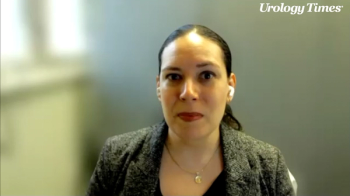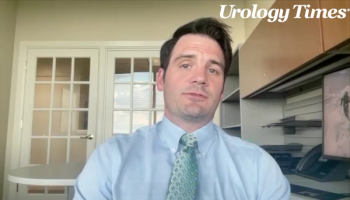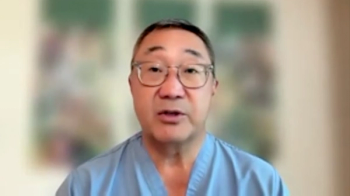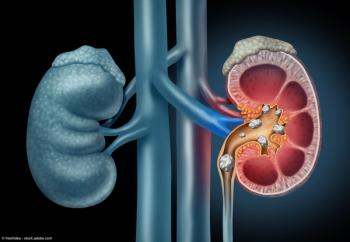
Amy N. Luckenbaugh, MD, FACS, shares what her patients have taught her about resilience as well as some of the advances in urologic oncology that are giving her hope.

Amy N. Luckenbaugh, MD, FACS, shares what her patients have taught her about resilience as well as some of the advances in urologic oncology that are giving her hope.

Cameron J. Britton, MD, highlights key findings from a study of the MyProstateScore 2.0 in predicting upgrading to GG≥3 prostate cancer.

Jennifer A. Robles, MD, MPH, discusses the future for HoLEP in terms of innovation and wider integration into urologic practice.

Jennifer A. Robles, MD, MPH, highlights the impact of regional disparities in HoLEP access on patient care.

Jennifer A. Robles, MD, MPH, outlines 3 key factors that may be preventing more widespread adoption of HoLEP across the US.

Jennifer A. Robles, MD, MPH, highlights potential factors contributing to the surge in HoLEP utilization across the US.

Jennifer A. Robles, MD, MPH, discusses a study assessing trends and geographic disparities in HoLEP utilization across the United States.

Five-year data from the phase 3 KEYNOTE-426 trial confirm the clinical benefits of front-line pembrolizumab plus axitinib in advanced ccRCC.

Ultimately, the take-home message for practicing urologists is to apply TMT judiciously, taking into account the patient's clinical profile, personal values, and financial situation.

According to Daniel D. Joyce, MD, MS, policy initiatives should focus on improving the value and efficiency of radiation.

Findings indicated that although trimodal therapy improved the quality of life for patients with muscle-invasive bladder cancer compared with cystectomy, its significantly higher cost made it not cost-effective.

Treatment with the Revi System led to durable QOL benefits at 24 months, even among those patients who did not achieve the primary end point.

The CELLEBRATE trial is aiming to provide additional evidence to support the safety and efficacy of iltamiocel.

Nearly 60% of patients taking vibegron remained on treatment at 1 year.

"This trial will be the benchmark for research reporting in the future," says Melissa R. Kaufman, MD, PhD, FACS.

The CR rate was 71% in patients with BCG-unresponsive NMIBC with CIS with or without papillary disease.

In this episode, guideline chair Melissa Kaufman, MD, PhD, FACS, highlights key points from the new AUA GSM guideline and illustrates its impact for clinical management of this condition.

“I always encourage urologists and physicians in general to keep up with the organizations that they're a part of, like the AUA, that often advocate on your behalf," says Ruchika Talwar, MD.

“A key point is the supply chain is very fragile, and there's not really a good financial incentive to make these drugs," says Ruchika Talwar, MD.

“Having a broader understanding of why someone might be experiencing the disease process or symptoms that they're coming in with is really meaningful and helpful, both to patients and to physicians,” says William Furuyama, MD.

"I think targeting things that make communities more vulnerable would be reasonable things to target to try and affect disease practices," says William Furuyama, MD.

"The take-home point from our study of these 92 patients is that in metastatic kidney cancer, there's a high concordance [between] MRD positivity and patients having progressive disease," says Alan Tan, MD.

"It was interesting to think about the relationship between a disease process and a person's environment, and measure that and establish that relationship in a quantitative way," says William Furuyama, MD.

WNT9B E152K was associated with a 2.5-fold increase in the risk of prostate cancer and reached genome-wide significance.

"The notion that the urine is sterile should be hopefully abolished by now, especially in this group where we know that these individuals do have a lot of bacteria growing in their bladders," says Brendan T. Frainey, MD.

"The goal for this study was to understand, over the lifetime in individuals with spina bifida, what bacteria are present in their urine normally, what bacteria are present when they have a UTI, and what are some important clinical differences we can tease out to help understand which patients should really be treated," says Brendan T. Frainey, MD.

"I hope that [attendees] will be exposed to a community where they feel that they're able to freely ask questions, gain accurate information, and feel heard, validated, and connected," says Lauren E. Corona, MD.

“What this means for patients is that thiazides remain an important option in the toolkit for preventing kidney stone recurrence,” says Ryan S. Hsi, MD, FACS.

"Access to clean water and having reliable sewage systems is a huge public health issue," says Elisabeth M. Sebesta, MD.

Data showed that Hispanic patients were consistently underrepresented in clinical trials, while Black participants tended to be overrepresented.